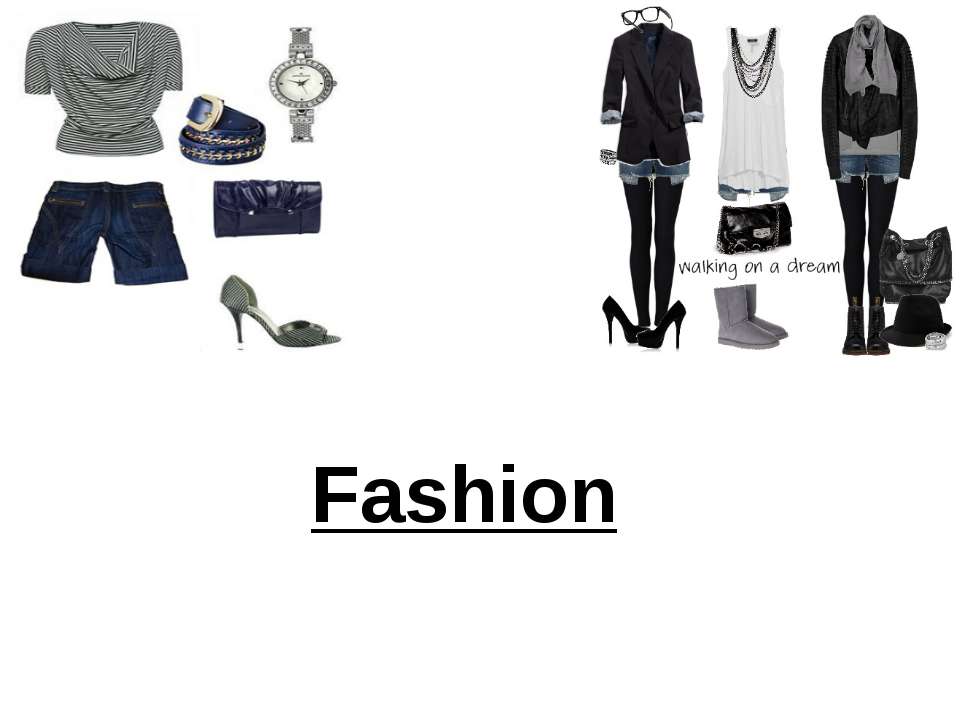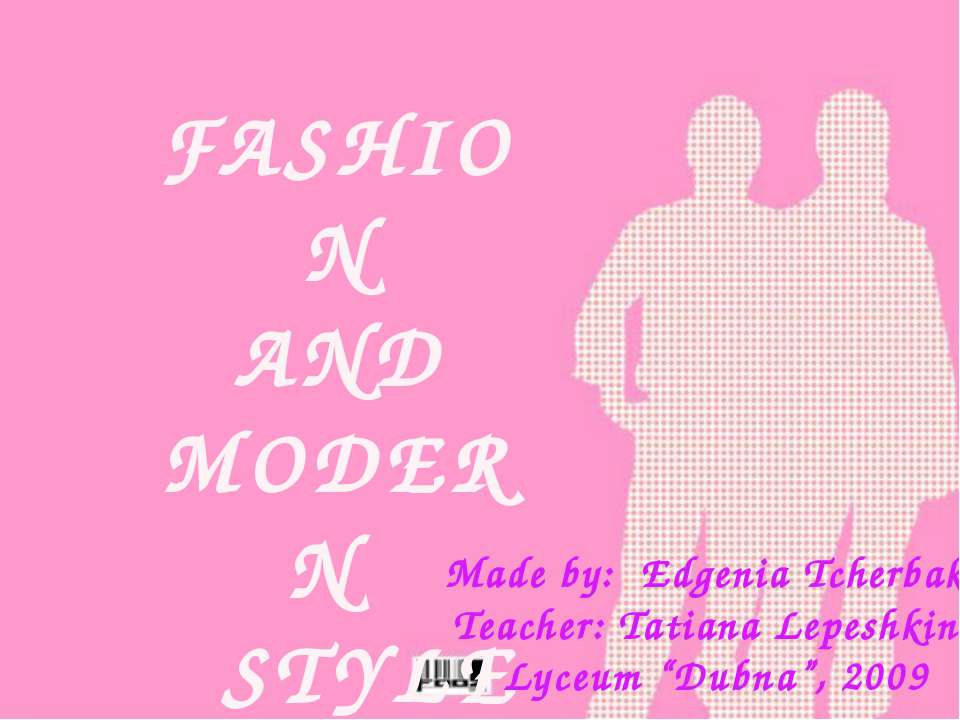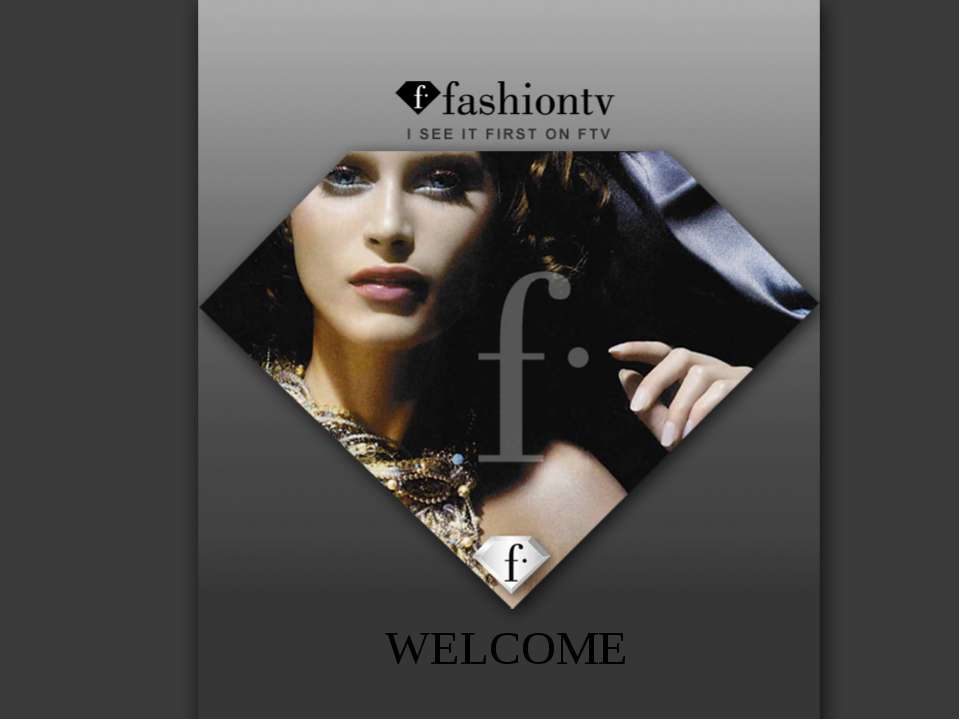Fashion

- Рубрика: Презентации / Презентации по английскому языку
- Просмотров: 487
Презентация "Fashion" онлайн бесплатно на сайте электронных школьных учебников edulib.ru
Style Fashion is a general term for a popular style or practice, especially in clothing, footwear, accessories, makeup, or furniture. "Fashion" refers to a distinctive; however, often-habitual trend in a look and dress up of a person, as well as to prevailing styles in behavior. "Fashion" usually is the newest creations made by designers and are bought by only a few number of people; however, often those "fashions" are translated into more established trends.
Fashion industry The fashion industry is a product of the modern age. Prior to the mid-19th century, most clothing was custom made. It was handmade for individuals, either as home production or on order from dressmakers and tailors. By the beginning of the 20th century—with the rise of new technologies such as the sewing machine, the rise of global capitalism and the development of the factory system of production, and the proliferation of retail outlets such as department stores—clothing had increasingly come to be mass-produced in standard sizes and sold at fixed prices. Although the fashion industry developed first in Europe and America, today it is an international and highly globalized industry, with clothing often designed in one country, manufactured in another, and sold world-wide. For example, an American fashion company might source fabric in China and have the clothes manufactured in Vietnam, finished in Italy, and shipped to a warehouse in the United States for distribution to retail outlets internationally.
Fashion industry The fashion industry has long been one of the largest employers in the United States, and it remains so in the 21st century. However, employment declined considerably as production increasingly moved overseas, especially to China. Because data on the fashion industry typically are reported for national economies and expressed in terms of the industry’s many separate sectors, aggregate figures for world production of textiles and clothing are difficult to obtain. However, by any measure, the industry accounts for a significant share of world economic output. The fashion industry consists of four levels: the production of raw materials, principally fibres and textiles but also leather and fur; the production of fashion goods by designers, manufacturers, contractors, and others; retail sales; and various forms of advertising and promotion. These levels consist of many separate but interdependent sectors, all of which are devoted to the goal of satisfying consumer demand for apparel under conditions that enable participants in the industry to operate at a profit.
fashion journalism An important part of fashion is fashion journalism. Editorial critique, guidelines and commentary can be found in magazines, newspapers, on television, fashion websites, social networks and in fashion blogs. In the recent years, fashion blogging and YouTube videos have become a major outlet for spreading trends and fashion tips. Through these media outlets, readers and viewers all over the world can learn about fashion, making it very accessible.
fashion journalism At the beginning of the 20th century, fashion magazines began to include photographs of various fashion designs and became even more influential on people than in the past. In cities throughout the world these magazines were greatly sought-after and had a profound effect on public clothing taste. Talented illustrators drew exquisite fashion plates for the publications which covered the most recent developments in fashion and beauty. Perhaps the most famous of these magazines was La Gazette du Bon Ton which was founded in 1912 by Lucien Vogel and regularly published until 1925 (with the exception of the war years).
VOGUE Vogue, founded in the US in 1892, has been the longest-lasting and most successful of the hundreds of fashion magazines that have come and gone. Increasing affluence after World War II and, most importantly, the advent of cheap colour printing in the 1960s led to a huge boost in its sales, and heavy coverage of fashion in mainstream women's magazines—followed by men's magazines from the 1990s. Haute couture designers followed the trend by starting the ready-to-wear and perfume lines, heavily advertised in the magazines, that now dwarf their original couture businesses. Television coverage began in the 1950s with small fashion features. In the 1960s and 1970s, fashion segments on various entertainment shows became more frequent, and by the 1980s, dedicated fashion shows such as Fashion-television started to appear. Despite television and increasing internet coverage, including fashion blogs, press coverage remains the most important form of publicity in the eyes of the fashion industry.
However, over the past several years, fashion websites have developed that merge traditional editorial writing with user-generated content. Online magazines like iFashion Network, and Runway Magazine, led by Nole Marin from America's Next Top Model, have begun to dominate the market with digital copies for computers, iPhones and iPads. Example platforms include Apple and Android for such applications. fashion journalism
fashion journalism A few days after the 2010 Fall Fashion Week in New York City came to a close, The New Islander's Fashion Editor, Genevieve Tax, criticized the fashion industry for running on a seasonal schedule of its own, largely at the expense of real-world consumers. "Because designers release their fall collections in the spring and their spring collections in the fall, fashion magazines such as Vogue always and only look forward to the upcoming season, promoting parkas come September while issuing reviews on shorts in January," she writes. "Savvy shoppers, consequently, have been conditioned to be extremely, perhaps impractically, farsighted with their buying
fashion industry Within the fashion industry, intellectual property is not enforced as it is within the film industry and music industry. To "take inspiration" from others' designs contributes to the fashion industry's ability to establish clothing trends. For the past few years,WGSN has been a dominant source of fashion news and forecasts in steering fashion brands worldwide to be "inspired" by one another. Enticing consumers to buy clothing by establishing new trends is, some have argued, a key component of the industry's success. Intellectual property rules that interfere with the process of trend-making would, on this view, be counter-productive. In contrast, it is often argued that the blatant theft of new ideas, unique designs, and design details by larger companies is what often contributes to the failure of many smaller or independent design companies.
Lady Gaga’s controversial meat dress This isn’t a joke. Lady Gaga’s controversial meat dress that she wore to the MTV Video Music Awards is being turned into beef jerky! Franc Fernandez, the designer of the meaty piece says: “The dress will go through a process where it becomes a sort of ‘jerky.’ But never fear, it will not be available to eat it will be “archived” for posterity. Fernandez says that he bought 50 pounds of meat and designed the dress over three days, refrigerating it in between sessions. Over time, the metamorphosis into jerky is natural. “The meat dries out, rather than rotting. But it shouldn’t be worn again.” He also adds he’s not planning on designing another one: “There’s not going to be meat dresses in the future. This was made for a specific purpose. It’s what it is.”






















